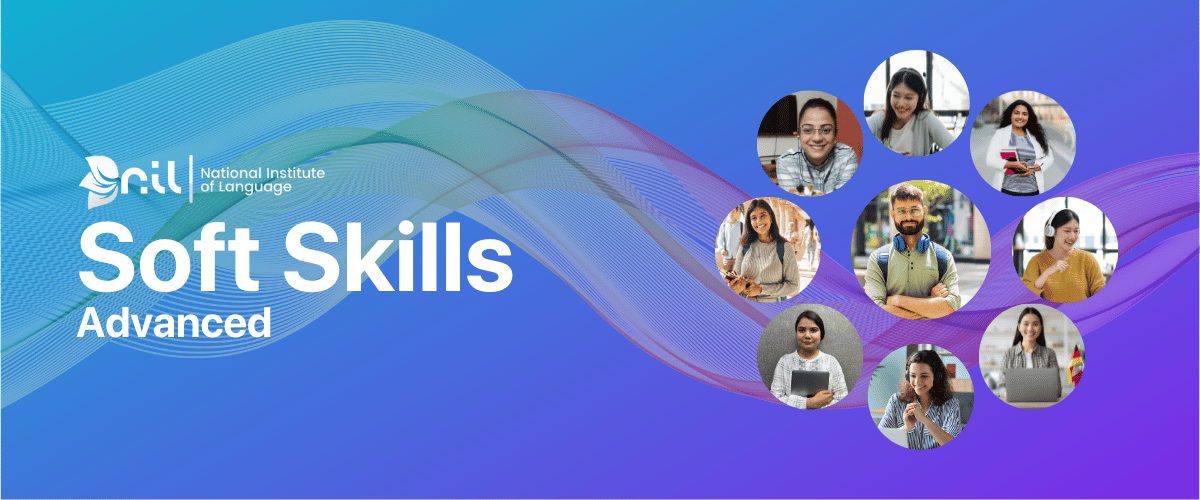
Soft Skills Training
Soft Skills Training is a supplemental course to Foundation English Course that focuses on efficient communication. (For CEFR Level B1 and above)
12 Weeks
5-7 Hours/week
Fully Customized
After Course
Soft Skills training gives benefits for Empowerment, Mastery & Purpose ability to communicate effectively with co-workers, employers, clients and customers, friends and family members etc.
National Institute of Language brings well designed & customised Soft Skills Training programs that help to build up the Confidence, Organized, Efficient and Adaptable workforce. Soft skills are the nurturing of your innate personal development. These skills enhance the ability to; Negotiate, Network, Resolve Conflicts and Develop Cohesiveness etc.
Soft Skills are personal attributes, personality traits, inherent social cues, and communication abilities needed for success on the job. Soft skills characterise how a person interacts in his or her relationships with others.
Why Soft Skills Matter?
- Skills such as listening, collaborating with others, presenting ideas and communicating with team members are all highly valued in the modern workplace.
- Strong soft skills ensure a productive, collaborative and healthy work environment, all vital attributes for organisations in an increasingly competitive world
- The modern market offers consumers an unlimited number of choices through technologies such as the internet and smartphones. For these consumers, convenience and low prices are easy to come by, so customer service is often what influences the choice to use a particular business. The ability to communicate efficiently and effectively with customers is therefore a vital factor in an organisation’s success.
- Rectification of Grammar.
- Grammatical Error Correction (GEC) is the task of correcting different kinds of errors in text such as spelling, punctuation, grammatical, and word choice errors.
- Personal accountability.
- Degree of collaboration.
- Interpersonal negotiation
- Conflict resolution
- Adaptability and flexibility.
- Creative thinking.
- Team management stress management
- Goal setting
- Swot analysis
- Leadership skills
- Soft skills
- Workplace etiquette
- Strategic thinking
- Emotional intelligence
- Building trust
- Effective writing skills
- Employees feedback
- Work life balance
- Presentation skills
- Conducting effective interviews
Soft Skills include:
Adaptability, attitude, communication, creative thinking, work ethic, teamwork, networking, decision making, positivity, time management, motivation, flexibility, problem-solving, critical thinking, and conflict resolution.
Resume Building Training – Through the resume-building session, candidates are able to get an insight into key areas, concerns, and sections that modern recruiters and hiring managers care the most about. The key points covered under this session are.
- Drafting error-free CVs/ Resumes and Cover Letters
- Selecting the ideal format
- Content drafting along with sequencing
- Art of representing one’s qualifications and most relevant work history
Mock Interview Sessions:
Mock Interviews help candidates formulate smart answers and identify strengths and weaknesses, thereby preparing them for the “real thing”. The mock sessions are a mirror of an actual job interview. It enables students with an opportunity to practice what to say and do during an interview. Whether its face-to-face, online, or through a webcam, a mock interview is useful in reviewing answers to common interview questions and assessing other factors such as confidence and body language.
Enable a Confident, Proactive and Dynamic Workforce by training them on:
Communication
Active listening, Excellent presentation and Writing capabilities
Organization
Planning and effectively implementing projects and routine work tasks
Punctuality
Understanding the importance of time and time management
Teamwork
Working with other team members in achieving goals, helping and supporting other team members
Critical Thinking
Using imagination, reasoning, past-experience, research, and resources for decision-making and problem solving
Social Skills
Handle Situations when dealing with people, regardless of stature, position, rank, personality
Creativity
Being resourceful and innovative in finding solutions to problems at work
Interpersonal Communication
Ability to handle situation in a team, relate to people, and manage conflict in the workplace
Adaptability
Ability to adapt to changes, pick up on new technologies and adjust to changing business surroundings
Process of Soft Skills Training
ANALYZE: We identify your Training objectives and needs. A study on your current business and participants profile, experience and academics are done.
ASSESS & DELIVER: We work on required content, customize and develop as per your needs. Pre-training assessment is done to assess the existing knowledge and skill level of your team before embarking on a training program. Training is delivered.
REVIEW & EVALUATE: We take continuous feedback for smooth flow of the training. Post-training assessment tests and doubt clearing sessions are done. Performance-based certification is rolled out.
Soft Skills Training Topics
We train Professionals and College Students on Interpersonal Communication, Presentation Skills, Team work, Negotiation Skills, Leadership, etc. depending on their current role and future aspirations. We have wide range of topics covered under the Soft Skills Training Program listed as below:
Soft Skills Training Courses
Soft Skills Training for Corporate
- Interpersonal Communication
- Presentation Skills
- Email and Virtual Communication
- Assertiveness
- Working in Teams
- Negotiation Skills
- Leadership Management
- Art of Effective Pitching
Soft Skills Training for College Students
- Interpersonal Communication
- Presentation Skills
- Email and Virtual Communication
- Assertiveness
- Working in Teams
- Negotiation Skills
- Leadership Management
- Art of Effective Pitching
- Mock Interview Prep-up
- CV Writing
National Institute of Language prides itself on the quality training it provides. All the trainers at National Institute of Language are certified by British Council or Cambridge. These trainers have been trained rigorously in all teaching methodologies to impart best in class training for each student. Each of our language trainers has gone through years of training and hands-on experience to facilitate efficient and effective training to all the students.
The enrolment process is simple:
- Make a payment Enter your name, email and phone number in the payment dialogue window.
- Take a screenshot once the payment is successful and send it on: +91 9569285185 or, wait for sometime and you will receive a call for further instructions.
- Meanwhile, make an account on the website with your email ID (you can just login with Google
as well to keep it simple)
- Provide your email ID to your counsellor when you receive the call to activate your ID and schedule your classes.
Looking for something basic?
Not sure what to do?
Talk to our student counsellor for more details on our courses and choose the one that suits you best.









